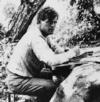- London, Jack
-
born Jan. 12, 1876, San Francisco, Calif., U.S.died Nov. 22, 1916, Glen Ellen, Calif.U.S. novelist and short-story writer.Born to poverty, the largely self-educated London became a sailor, hobo, Alaskan gold miner, and militant socialist. He gained a wide audience with his first book, The Son of the Wolf (1900), and the story "To Build a Fire" (1908). Thereafter he wrote steadily; his 50 books of fiction and nonfiction, including many romantic depictions of elemental struggles for survival as well as socialist tracts, include The Call of the Wild (1903), The Sea-Wolf (1904), White Fang (1906), The Iron Heel (1907), Martin Eden (1909), and Burning Daylight (1910). Though his work brought him wealth and fame, his suicide at age 40 was the result of alcoholism and mounting debt.
 Jack London writing The Sea Wolf, 1904.Jack London State Historic Park
Jack London writing The Sea Wolf, 1904.Jack London State Historic Park* * *
▪ American authorpseudonym of John Griffith Chaneyborn Jan. 12, 1876, San Francisco, Calif., U.S.died Nov. 22, 1916, Glen Ellen, Calif.American novelist and short-story writer whose works deal romantically with elemental struggles for survival. He is one of the most extensively translated of American authors.Deserted by his father, a roving astrologer, London was raised in Oakland, Calif., by his spiritualist mother and his stepfather, whose surname, London, he took. At 14 he quit school to escape poverty and gain adventure. He explored San Francisco Bay in his sloop, alternately stealing oysters or working for the government fish patrol. He went to Japan as a sailor and saw much of the United States as a hobo riding freight trains and as a member of Kelly's industrial army (one of the many protest armies of unemployed born of the panic of 1893). He saw depression conditions, was jailed for vagrancy, and in 1894 became a militant socialist. London educated himself at public libraries with the writings of Charles Darwin, Karl Marx, and Friedrich Nietzsche, usually in popularized forms, and created his own amalgam of socialism and white superiority. At 19 he crammed a four-year high school course into one year and entered the University of California at Berkeley, but after a year he quit school to seek a fortune in the Klondike gold rush of 1897. Returning the next year, still poor and unable to find work, he decided to earn a living as a writer.London studied magazines and then set himself a daily schedule of producing sonnets, ballads, jokes, anecdotes, adventure stories, or horror stories, steadily increasing his output. The optimism and energy with which he attacked his task are best conveyed in his autobiographical novel Martin Eden (1909), perhaps his most enduring work. Within two years stories of his Alaskan adventures, though often crude, began to win acceptance for their fresh subject matter and virile force. His first book, The Son of the Wolf (1900), gained a wide audience. During the remainder of his life he produced steadily, completing 50 books of fiction and nonfiction in 17 years. Although he became the highest-paid writer in the United States, his earnings never matched his expenditures, and he was never freed of the urgency of writing for money. He sailed a ketch to the South Pacific, telling of his adventures in The Cruise of the Snark (1911). In 1910 he settled on a ranch near Glen Ellen, Calif., where he built his grandiose Wolf House. He maintained his socialist beliefs almost to the end of his life.Jack London's hastily written output is of uneven quality. His Alaskan stories Call of the Wild (1903), White Fang (1906), and Burning Daylight (1910), in which he dramatized in turn atavism, adaptability, and the appeal of the wilderness, are outstanding. In addition to Martin Eden, he wrote two other autobiographical novels of considerable interest: The Road (1907) and John Barleycorn (1913). Other important works are The Sea Wolf (1904), which features a Nietzschean superman hero, and The Iron Heel (1907), a fantasy of the future that is a terrifying anticipation of fascism. London's reputation declined in the United States in the 1920s when a brilliant new generation of postwar writers made the prewar writers seem lacking in sophistication, but his popularity has remained high throughout the world, especially in Russia, where a commemorative edition of his works published in 1956 was reported to have been sold out in five hours. A three-volume set of his letters, edited by Earle Labor et al., was published in 1988.Additional ReadingIn addition to personal accounts by the writer's wife, Charmian London, The Book of Jack London, 2 vol. (1921); and daughter, Joan London, Jack London and His Times (1939, reprinted 1968); biographies include Russ Kingman, A Pictorial Life of Jack London (1979); and Andrew Sinclair, Jack: A Biography of Jack London (1977). London's short stories are examined in Earle Labor, Jack London (1974); and James I. McClintock, White Logic (1975). See also Robert Barltrop, Jack London: The Man, the Writer, the Rebel (1976); and Charles N. Watson, Jr., The Novels of Jack London (1983).* * *
Universalium. 2010.
